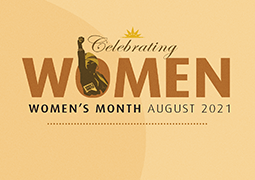
The Women’s Charter, as reviewed in 2021, should be a living document that will ensure effective implementation and monitoring of gender sensitive policies and bring an end to gender-based violence and femicide. Women parliamentarians attended the launch of the Charter and raised a number of issues they regarded as obstacles that needed to be tackled.
Women from different organisations and sectors pledged support on the launch of the reviewed Women’s Charter.
Ms Machwene Semenya (ANC Women’s League) said:
Today we join the Women’s Charter 2021 to its historical roots. The first Women’s Charter was crafted in 1954 when women converged at the conference to draft a charter that has come to symbolise the lasting legacy of strength.
The charter demands the removal of all issues that keep women in positions of inferiority, but are there resources available to implement the charter and, if not, how will they be found? Will descriptive women’s empowerment equate to substantive empowerment?
Prof Hlengiwe Mkhize (Deputy Minister in the Presidency) said:
Government welcomes this document that sets out an agenda for women advancement and development for the next 25 years. The charter is not something that is worth talking about when the going is easy. We ought to embrace the charter ensure that it becomes a lived-values document in both good and bad times. We should be the ones, on an ongoing basis, to remind the public and our organisations to say: we have a charter that should guide us in our activism.
The Gauteng statistics for teenage pregnancies in one year is concerning and is the tip of an iceberg, as private terminations and unregistered births have not been accounted for. It is a frightening reality when girls as young as 10 become mothers. This is statutory rape in our country, yet we normalise it. We start to think about child support and sending the girls back to school. We need to start to think of this as a serious crime against the girl child and that perpetrators are held to account.
Ms Zandile Nkomo (Whip from the Multi Party Women’s Caucus) said:
The charter will serve as a voice of women during engagements. South Africa has achieved a lot in terms of advancement of women, but there are still social and political obstacles that need to be tackled. Women still bear the brunt of unpaid care work. Female-headed households are still the poorest and this situation had been worsened by the Covid-19 outbreak.
Political representation, especially in the local sphere of government, is critical and local government elections are around the corner. All political parties should adopt the 50/50 gender quota. The charter is well-crafted road-map and will help when dealing with monitoring departments on targets. We need to ensure the charter is a guide; we need to unite for the achievements of the ideals in the new charter.
Ms Nazley Sharif (Democratic Alliance) said:
It is important to acknowledge where women come from, but equally important is to put in the bricks that will help guide where we want to go in the future. In order for government to achieve women’s development, it must construct gender-sensitive policies and implementation instruments without which the Women’s Charter will remain a document that serves no real purpose, except to perpetuate an unreachable idea that has no meaning to women in the country.
Acceleration of gender equality will heavily depend on the political will and direction by executives and their respective departmental heads. All legislatures should be responsible and ensure effective oversight and implementation to see if the lives of women have been positively impacted. Oversight and monitoring and evaluation must form part of parcel of the charter. We all have a role to play.
Ms Zandile Majozi (African National Congress) said:
Government policies should have tangible performance targets that are spelt out in the charter. We need to demand action from the executives. Parliament should scrutinise performance targets and hold those assigned to advance women’s rights accountable. We cannot wait for another review to show that there are challenges. We need to act; we need to remove from power those feasting on resources that could be used to advance women empowerment. Let us not wait for another 25 years to deliver.
Ms Natasha Ntlangwini (Economic Freedom Fighters) said:
For far too long, South African women have been subjected to sub-human conditions. The Department of Basic Education loses a significant number of learners, many of whom are girl children, who will grow to be women who are more vulnerable in workplaces and homes.
The department must account for each girl who enters a school from grade 1 to grade 12. It should not be accepted as normal when they drop out of school. Women must have access to land and markets and receive support if they want to grow their own businesses.
Ms Marie Sukers (African Christian Democratic Party) said:
The economic advancement of women is a key catalyst to an equal society. We must stand as one to remove barriers to learning, health and wellness. The issues faced by women require recognition of the faith-based community. For this document to be realised, we must unite and virtue must be embraced, the virtue of the girl-child and the woman.
Sibongile Maputi
23 August

